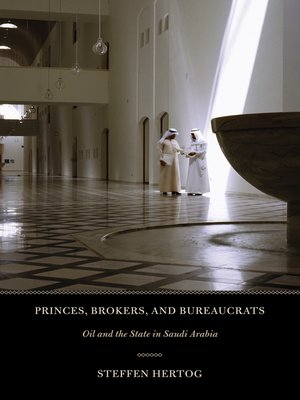
Sign up to save your library
With an OverDrive account, you can save your favorite libraries for at-a-glance information about availability. Find out more about OverDrive accounts.
Find this title in Libby, the library reading app by OverDrive.



Search for a digital library with this title
Title found at these libraries:
| Loading... |
In Princes, Brokers, and Bureaucrats, the most thorough treatment of the political economy of Saudi Arabia to date, Steffen Hertog uncovers an untold history of how the elite rivalries and whims of half a century ago have shaped today's Saudi state and are reflected in its policies. Starting in the late 1990s, Saudi Arabia embarked on an ambitious reform campaign to remedy its long-term economic stagnation.
The results have been puzzling for both area specialists and political economists: Saudi institutions have not failed across the board, as theorists of the "rentier state" would predict, nor have they achieved the all-encompassing modernization the regime has touted. Instead, the kingdom has witnessed a bewildering mélange of thorough failures and surprising successes. Hertog argues that it is traits peculiar to the Saudi state that make sense of its uneven capacities.
Oil rents since World War II have shaped Saudi state institutions in ways that are far from uniform. Oil money has given regime elites unusual leeway for various institutional experiments in different parts of the state: in some cases creating massive rent-seeking networks deeply interwoven with local society; in others large but passive bureaucracies; in yet others insulated islands of remarkable efficiency. This process has fragmented the Saudi state into an uncoordinated set of vertically divided fiefdoms.
Case studies of foreign investment reform, labor market nationalization and WTO accession reveal how this oil-funded apparatus enables swift and successful policy-making in some policy areas, but produces coordination and regulation failures in others.
|In Princes, Brokers, and Bureaucrats, the most thorough treatment of the political economy of Saudi Arabia to date, Steffen Hertog uncovers an untold history of how the elite rivalries and whims of half a century ago have shaped today's Saudi state and are reflected in its policies.
Starting in the late 1990s, Saudi Arabia embarked on an ambitious reform campaign to remedy its long-term economic stagnation. The results have been puzzling for both area specialists and political economists: Saudi institutions have not failed across the board, as theorists of the "rentier state" would predict, nor have they achieved the all-encompassing modernization the regime has touted. Instead, the kingdom has witnessed a bewildering mélange of thorough failures and surprising successes.
Hertog argues that it is traits peculiar to the Saudi state that make sense of its uneven capacities. Oil rents since World War II have shaped Saudi state institutions in ways that are far from uniform. Oil money has given regime elites unusual leeway for various institutional experiments in different parts of the state: in some cases creating massive rent-seeking networks deeply interwoven with local society; in others large but passive bureaucracies; in yet others insulated islands of remarkable efficiency. This process has fragmented the Saudi state into an uncoordinated set of vertically divided fiefdoms. Case studies of foreign investment reform, labor market nationalization and WTO accession reveal how this oil-funded apparatus enables swift and successful policy-making in some policy areas, but produces coordination and regulation failures in others.






